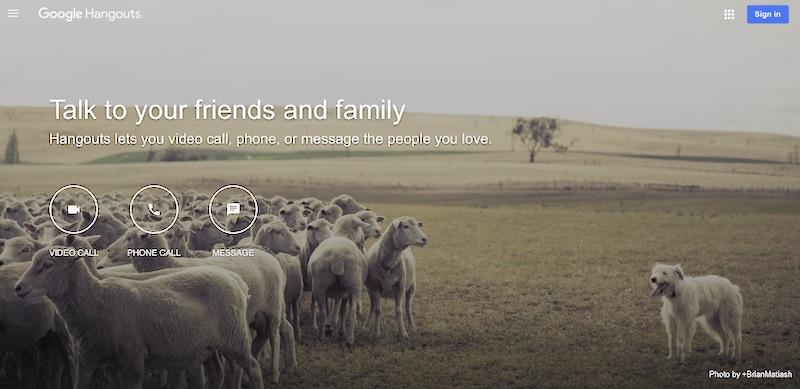
Consistent, in-person meetings with an SEO team is critical for success. Google Hangouts, a free service, helps remote participants stay engaged.
Whether your search engine optimization team is in-house or at an agency, staying in touch with what they’re working on is critical. A team left to their own devices may eventually flounder based on lack of direction, or worse, go in the wrong direction.
Meeting Structure
First and foremost, define a clearly articulated SEO meeting structure and make sure that the meetings appear on everyone’s calendars, as recurring. The basic structure should include a weekly checkpoint, with one of the weekly meetings used to also discuss monthly performance.
Every meeting should have a specific purpose, owner, and agenda. Everyone should know why she is attending and what will be covered so that she comes prepared to discuss or make the necessary decisions. Make sure that all the players can attend the meeting that need to have a say, or that they send a proxy in their place. The last thing you need is to waste time having a meeting to talk about that thing you talked about previously.
Ad hoc meetings are a reality of life, but try to have as many discussions as possible within the structured meetings already set in place. That’s why they’re there — to corral relevant topics into a single time and place for efficient use of everyone’s time.
If you’re working with an agency, remember that the meeting time will come out of your overall contracted hours. The more meetings you have, the fewer hours the agency has to make recommendations and implementations. However, some meetings are necessary or the work will go sideways. Be judicious with meeting time, and foster an environment where you and your team can speak openly about priorities and resources.
In Person and On Camera
Face-to-face communication is important. It increases levels of understanding and helps to build rapport. You accomplish more when you have a visual working relationship with your peers than when you’re simply a voice on the phone.
Hold weekly meetings in person, around a table. If you can’t be in the same place, videoconference instead. Even if only one person is working remotely from the rest of the team, a videoconference will help keep remote folks engaged and remind in-room team members that the remote people are “present” and that their work is important. Try it. Every laptop has a video camera. Google Hangouts lets you video chat for free with as many team members as you like. Join.me allows up to three attendees — or laptops with multiple people attending at each location — for free.
Roadmaps and Project Lists
Every program needs a roadmap — a document that outlines all the projects planned for the year, who owns them, when they’re due, and includes links to any documentation for that project.
Roadmaps aren’t shackles that restrict your ability to manage natural search. They’re strategic guides that help you remember the important major initiatives and projects you need to implement regardless of the daily scuffle that is your work life. If fighting SEO fires and optimizing 10 more title tags takes over your whole day every day, then you don’t have time to plan and implement the needle-moving initiatives that will improve natural search performance.
Roadmaps aren’t shackles that restrict your ability to manage natural search. They’re strategic guides that help you remember the important major initiatives…
List everything that must be done this year to support the business’s product launches, campaigns, and initiatives. Then list all the strategic SEO projects that you need to get done. Make sure each has a short and descriptive project name, a date, and an owner.
Look for synergies between corporate launches and initiatives compared to the SEO improvements you need to do. Can you make a case that one of your projects is critical to a corporate launch so that you can perhaps use some of that budget to fuel SEO growth? Can you use corporate’s high-priority status to lend more visibility to your project?
Project lists are more specific and contain the nitty-gritty tasks that make the roadmap happen. If your projects are technical, your project list may be managed in JIRA, Basecamp, or another project management software program. If not, a list in Excel works just fine.
List every task that’s in flight or planned, along with its owner and due date. If the task has a counterpart in a tracking system, also include its number and link for easy access. Review the list of active tasks and projects in every weekly status meeting.
Make reviewing the entire list of active projects a standing agenda item in every weekly stats meeting. Even if some projects are delayed, or have been delayed for several weeks in a row, mentioning them reminds the team that the owner needs to act or that the project needs to be reprioritized or delayed, if circumstances have changed. Also review the upcoming projects.
Assigning Ownership
Always identify a single owner for a task and request. Clear ownership is critical to successful completion. When delegating, do so firmly and clearly, and specify a timeframe. This is not delegation: “We need to talk to IT to figure out canonical tags.” Everyone on the team thinks that this is someone else’s task. Instead, delegate firmly: “Joe, please call Susan on the IT team to figure out how to resolve the circular canonical tag issue. Can you do this by Wednesday?”
Realistic Expectations
Make sure that what you require of your SEO team is actually doable within the time allotted. It it’s not, break it into a phased piece so that something of value can be done by the allotted time. The remaining pieces required to get to full value should then be scheduled to a specific date so that they don’t get lost in the sea of other projects.
Trust your SEO team to provide realistic timeframes for deliverables and projects. If they need to extend a deadline, consider the reason. If the deadline needs to be extended, update the roadmap, and any other place that a date is mentioned, for consistent communication.
Reasons for extending deadlines include: (a) the scope grew, (b) the problem was deeper than at first known, (c) resources were reduced, (d) key decision-makers were unavailable, and (e) agreed-upon priorities changed.
Poor excuses for extending deadlines include: the team ran out of time or consistently underestimated the size of projects or issues.
When You’re Not an SEO Expert
Regardless of whether you are an SEO expert, you need to manage your SEO team. If you don’t know what they’re recommending or don’t understand why they’re recommending it, ask. You don’t need to be an SEO expert to manage an SEO agency. But you do need to learn enough as you go to guide their actions.
If your agency or in-house team doesn’t help you understand what needs to happen and how it relates to the other projects, then you might have the wrong agency or team. Either they don’t know the answer or they’re not willing to share the information.
It takes discipline and consistency to manage an SEO team, just as it does to manage any team. You don’t need to be harsh and overbearing. The key is to exercise self-discipline to ensure that you keep to the same communication structure consistently, and to require your SEO team to do the same.




